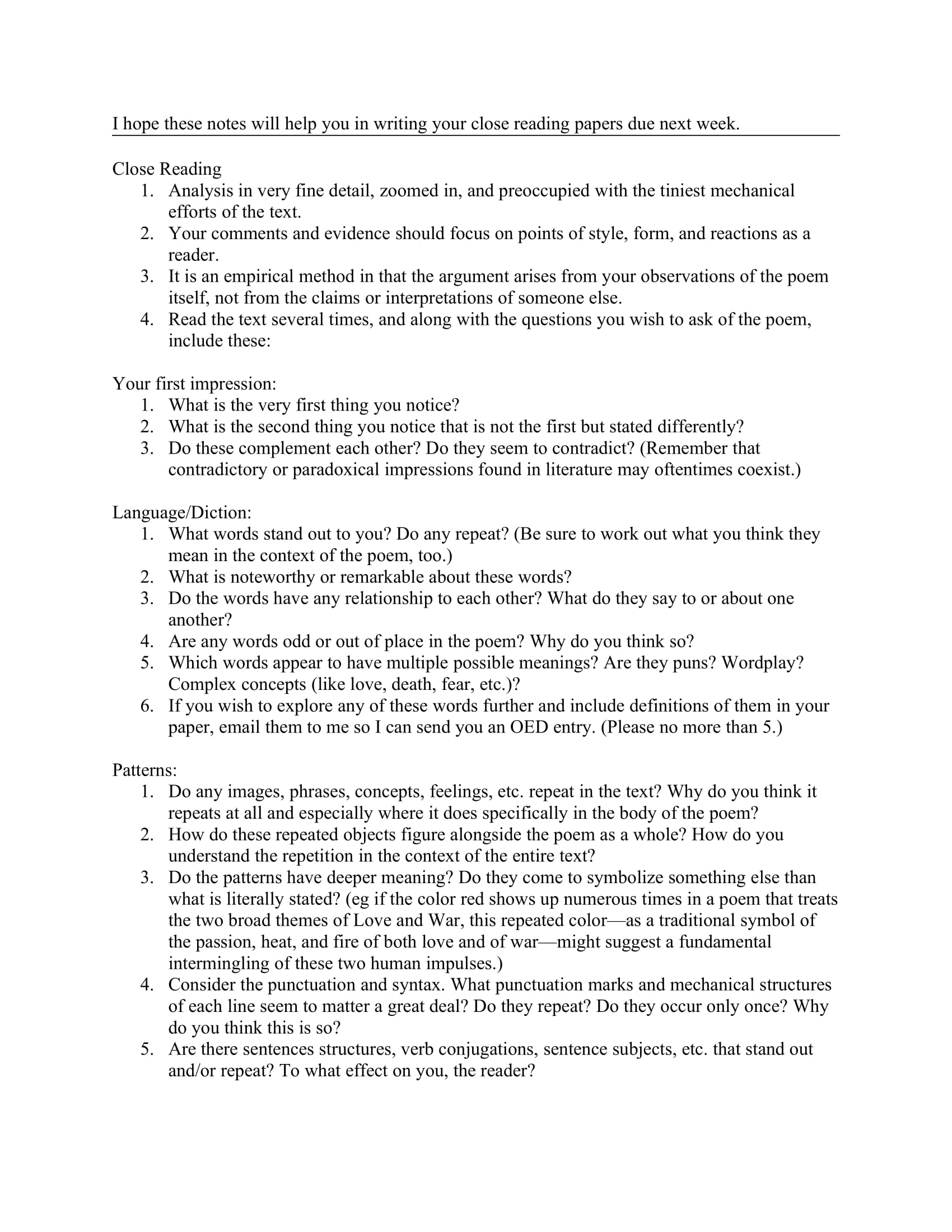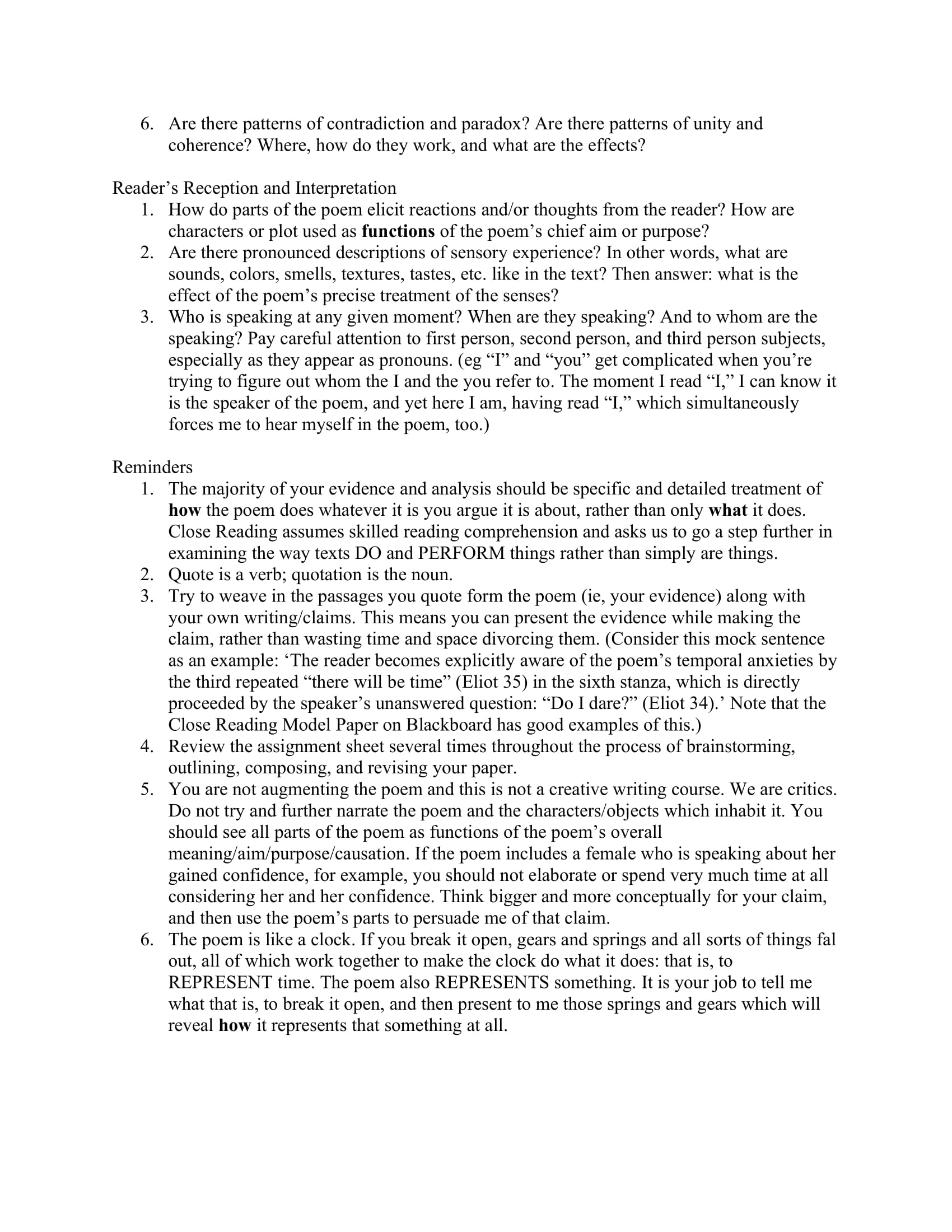Answered step by step
Verified Expert Solution
Question
1 Approved Answer
you should choose the poem you will analyze for that paper. Please upload a document to this assignment with the following: Poem title and author
you should choose the poem you will analyze for that paper. Please upload a document to this assignment with the following:
- Poem title and author
- Why did you chose this poem to analyze?
- What immediately stands out to you about the poem?
You may choose any poem so long as it is easily accessible online .
take this methodology you are help for analysis please write this poem with following :


I hope these notes will help you in writing your close reading papers due next week. Close Reading 1. Analysis in very fine detail, zoomed in, and preoccupied with the tiniest mechanical efforts of the text. 2. Your comments and evidence should focus on points of style, form, and reactions as a reader. 3. It is an empirical method in that the argument arises from your observations of the poem itself, not from the claims or interpretations of someone else. 4. Read the text several times, and along with the questions you wish to ask of the poem, include these: Your first impression: 1. What is the very first thing you notice? 2. What is the second thing you notice that is not the first but stated differently? 3. Do these complement each other? Do they seem to contradict? (Remember that contradictory or paradoxical impressions found in literature may oftentimes coexist.) Language/Diction: 1. What words stand out to you? Do any repeat? (Be sure to work out what you think they mean in the context of the poem, too.) 2. What is noteworthy or remarkable about these words? 3. Do the words have any relationship to each other? What do they say to or about one another? 4. Are any words odd or out of place in the poem? Why do you think so? 5. Which words appear to have multiple possible meanings? Are they puns? Wordplay? Complex concepts (like love, death, fear, etc.)? 6. If you wish to explore any of these words further and include definitions of them in your paper, email them to me so I can send you an OED entry. (Please no more than 5.) Patterns: 1. Do any images, phrases, concepts, feelings, etc. repeat in the text? Why do you think it repeats at all and especially where it does specifically in the body of the poem? 2. How do these repeated objects figure alongside the poem as a whole? How do you understand the repetition in the context of the entire text? 3. Do the patterns have deeper meaning? Do they come to symbolize something else than what is literally stated? (eg if the color red shows up numerous times in a poem that treats the two broad themes of Love and War, this repeated color as a traditional symbol of the passion, heat, and fire of both love and of warmight suggest a fundamental intermingling of these two human impulses.) 4. Consider the punctuation and syntax. What punctuation marks and mechanical structures of each line seem to matter a great deal? Do they repeat? Do they occur only once? Why do you think this is so? 5. Are there sentences structures, verb conjugations, sentence subjects, etc. that stand out and/or repeat? To what effect on you, the reader? I hope these notes will help you in writing your close reading papers due next week. Close Reading 1. Analysis in very fine detail, zoomed in, and preoccupied with the tiniest mechanical efforts of the text. 2. Your comments and evidence should focus on points of style, form, and reactions as a reader. 3. It is an empirical method in that the argument arises from your observations of the poem itself, not from the claims or interpretations of someone else. 4. Read the text several times, and along with the questions you wish to ask of the poem, include these: Your first impression: 1. What is the very first thing you notice? 2. What is the second thing you notice that is not the first but stated differently? 3. Do these complement each other? Do they seem to contradict? (Remember that contradictory or paradoxical impressions found in literature may oftentimes coexist.) Language/Diction: 1. What words stand out to you? Do any repeat? (Be sure to work out what you think they mean in the context of the poem, too.) 2. What is noteworthy or remarkable about these words? 3. Do the words have any relationship to each other? What do they say to or about one another? 4. Are any words odd or out of place in the poem? Why do you think so? 5. Which words appear to have multiple possible meanings? Are they puns? Wordplay? Complex concepts (like love, death, fear, etc.)? 6. If you wish to explore any of these words further and include definitions of them in your paper, email them to me so I can send you an OED entry. (Please no more than 5.) Patterns: 1. Do any images, phrases, concepts, feelings, etc. repeat in the text? Why do you think it repeats at all and especially where it does specifically in the body of the poem? 2. How do these repeated objects figure alongside the poem as a whole? How do you understand the repetition in the context of the entire text? 3. Do the patterns have deeper meaning? Do they come to symbolize something else than what is literally stated? (eg if the color red shows up numerous times in a poem that treats the two broad themes of Love and War, this repeated color as a traditional symbol of the passion, heat, and fire of both love and of warmight suggest a fundamental intermingling of these two human impulses.) 4. Consider the punctuation and syntax. What punctuation marks and mechanical structures of each line seem to matter a great deal? Do they repeat? Do they occur only once? Why do you think this is so? 5. Are there sentences structures, verb conjugations, sentence subjects, etc. that stand out and/or repeat? To what effect on you, the reader?
Step by Step Solution
There are 3 Steps involved in it
Step: 1
Poem Title and Author Middle Passage by Robert Hayden Reason for Choosing this Poem I chose Middle Passage by Robert Hayden because it is a powerful and thoughtprovoking poem that explores the histori...
Get Instant Access to Expert-Tailored Solutions
See step-by-step solutions with expert insights and AI powered tools for academic success
Step: 2

Step: 3

Ace Your Homework with AI
Get the answers you need in no time with our AI-driven, step-by-step assistance
Get Started


